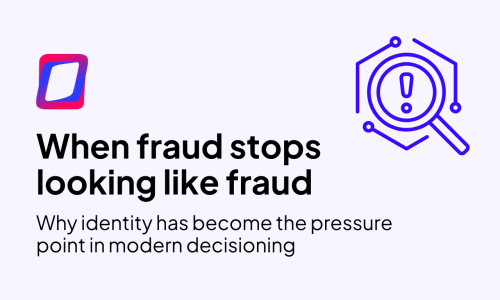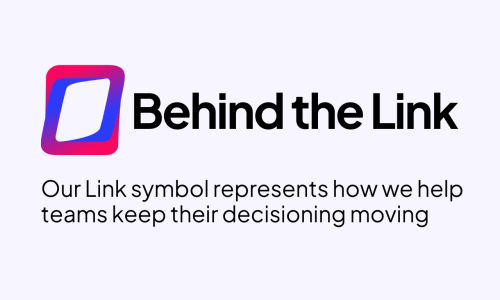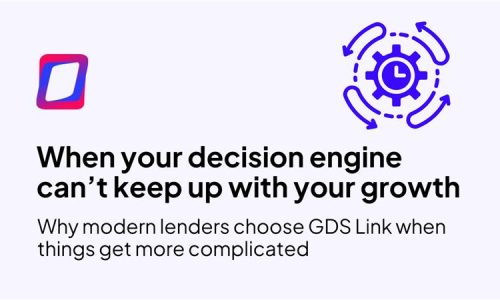Alternative Credit Scoring is now a Must-Have
Alternative Credit Solutions
Alternative credit scoring is not a new concept, in fact, the method first began making headlines as early as 2013. However, additional advancements in fintech, shifting consumer attitudes and recent changes to the market have made it a necessity for the modern lender to utilize.
Using alternative data and analytics to determine a borrower’s reliability provides more opportunities for borrowers and lenders alike — something that is of the utmost importance in the current economic climate.
Behavioral banking: The missing element for lenders
In 2013 alternative credit scoring made American Banker’s list of 10 Big Ideas for the year. Now, years later, it has ranked again. In the publisher’s 9 Big ideas for 2019, the concept of a “behavioral bank” is highlighted. This is a move away from traditional lending practices, and rather than determining pricing and loan offerings based on a borrower’s hard data, it’s based on their behavior.
By tracking the habits of potential borrowers, in general and specifically, regarding their finances, banks, and private lenders can personalize their offerings depending on a customer’s lifestyle. In the specific example, AB gave, a South African bank rewarded members of a specific promotional program points for going to the gym or purchasing healthy groceries.
In essence, this is very similar to the data alternative credit scoring requires to come to its conclusion. By collecting information on borrowers’ past payment history, like if they ever missed or defaulted on a loan, and other personal information such as utility bills and rental experience, lenders can comprehensively understand their finances and risk.
As a lender, it’s always important to know their customer and their risks. Even in current conditions, where an individual may be experiencing new financial hardships, analytics, and alternative data are best for identifying long-term borrowing behaviors that matter the most to a lender.
Another method that seamlessly integrates into behavioral finance is psychometric testing. While more popular outside the U.S., some lenders will ask potential borrowers to complete a short psychometric test that provides insight into their personality, intelligence, and integrity, among other things. These answers can help lenders determine the likelihood of a borrower paying back their loan in full.
The loosening of tight credit standards and a move toward understanding a borrower personally poses new prospects for lenders who have recently experienced a decline in their inbound leads.
Connect with new audiences online.
Today, the most important benefit of alternative credit scoring remains largely the same: Lenders can reach underserved audiences with personalized loan offers while mitigating risks.
A recent study conducted by YouGov and ScoreSense revealed that 53% of Americans are turned down for loans and taking on other debt solely due to having poor credit (widely accepted as being a score below 670). Traditional credit scoring only provides a narrow view of a customer based on their past financial borrowing experience. Still, it doesn’t consider their other history that could prove they are a reliable consumer.
Considering the same report found that the majority of Americans either have three or more credit cards (38%) or no credit cards at all (28%) — both of which can negatively impact a credit score — judging a borrower’s reliability just based on this information is not beneficial. In reality, many of the population have no or poor credit scores due to a nonexistent borrowing history or a period of trying to regain their financial strength. However, they still need loans. These potential customers are often difficult for financial services firms to engage with when basing their evaluations on traditional credit scoring models.
The reality is that lenders are still missing crucial information on a borrower’s creditworthiness that would help them tailor their offerings and mitigate risks. Alternative credit scoring increases credit access for borrowers of all ages, especially those in lower-income brackets. On the flip side, lenders are allowed to serve these audiences properly. In the digital age, where alternative data like utility payments can be securely shared with financial institutions, gaining this information and using analytics to aid decision-making is easier than ever.
The pressing need for alternatives
Clearly, the benefits of alternative data also extend into times of economic uncertainty. In another article by American Banker Barbara Sinsley, chief legal officer for Remitter USA and meldCX, highlights that alternative data may be the key to protecting consumer credit in the wake of the COVID-19 pandemic (or any economic crisis).
A scoring system that considers human behaviors and habits alongside financial history protects borrowers whose credit has been affected by uncertainty. Perhaps they lost their job and missed a payment or cut back on using credit altogether during this time; it should not automatically make them ineligible for a loan (this would also be unsustainable for lenders).
Elena Lonenko, a Forbes Councils Member, further argues that a FICO score can’t tell if an applicant is recently unemployed or suddenly has a reduced income that affects their credit. Alternative scoring is the solution to help these borrowers receive the loans they need and, in turn, help stimulate the economy and provide lenders with more qualified leads.
Building trust and novel opportunities
Using alternative data sources alongside analytics as part of the credit scoring process helps lenders fill in the gaps if a borrower’s traditional financial history is lacking. New fintech initiatives are creating lending analytics technology that can examine past transactions and spot habits in spending, income, payments, and even employment history with an applicant’s permission.
Since applicants can share this information, they are in control of their data and build trust with lenders who ensure their facts are kept confidential. This is the foundation for lenders to serve entirely new communities and build meaningful relationships with borrowers as the economy recovers.
If anything is certain, it’s that alternative credit scoring models are here to stay as more borrowers and lenders become aware of their benefits. GDS Link offers private lenders and financial institutions of all sizes a dedicated risk management and credit scoring system to help optimize their data usage.
Lenders can lend more, profit more, and risk less with a platform that organizes and streamlines all of the internal, traditional, and alternative data.
See Also: Credit Scoring Models With Machine Learning
Sources:
- Forbes – Alternative Credit Scoring For Retail Lenders During Economic Crises
- American Banker – 9 Big ideas for 2019
- Medium – Alternative Credit Scoring and Some Challenges
- PR Newswire – 53% of Americans Turned Down Due to Bad Credit
- American Banker – BankThink Alternative data could be lifeline for consumers needing credit
Top Credit Scoring Articles
Recent articles

When Fraud Stops Looking Like Fraud
Read article
Behind the Link
Read article





